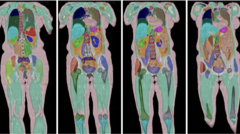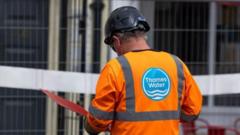What Does Scanning the 100,000th Person Mean for Human Imaging?

Revolutionizing Medical Research: The Impact of the UK Biobank Imaging Project
The UK Biobank has achieved a significant milestone in the realm of medical research, marking its progress with over a billion scans of volunteers. This ambitious study, which spans more than a decade, aims to provide unparalleled insights into human health as we age. The comprehensive imaging of 100,000 participants equips researchers with crucial data to detect diseases early and tailor treatments to individual needs. This article delves into the intricacies of this groundbreaking project, its implications for health research, and how it stands to transform our understanding of aging and disease prevention.
Understanding the UK Biobank
Launched in 2003, the UK Biobank is a vast resource, gathering biological samples and health data from half a million middle-aged volunteers. This project is a collaboration between the Medical Research Council, the Wellcome Trust charity, the Department of Health, and the Scottish government. The objective is to create a comprehensive database that helps scientists understand the interplay between genetics, lifestyle, and health outcomes.
The Scope of the Project
The UK Biobank focuses on several key areas:
- Biological Samples: Participants provide blood, urine, and saliva samples, which are stored at ultra-low temperatures for future analysis.
- Health Data Collection: Volunteers complete health and lifestyle questionnaires, providing a rich dataset for researchers.
- Imaging Component: Detailed scans of 100,000 participants using MRI, X-ray, and ultrasound techniques allow for an in-depth examination of various organs and systems.
The Imaging Project: A Closer Look
Initiated in 2014, the imaging aspect of the UK Biobank is a monumental endeavor aimed at understanding how our bodies change as we age. Each participant undergoes a five-hour appointment, which involves multiple types of scans. The data collected is anonymized, ensuring volunteers' privacy while providing invaluable insights into health trends.
Scanning Process and Technology
Participants are scanned using:
- Magnetic Resonance Imaging (MRI): This technique captures detailed images of the brain, heart, and other organs.
- X-rays: Useful for examining bones and joints.
- Ultrasound: Employed for soft tissue imaging.
Each type of imaging reveals different aspects of health, and together, they create a comprehensive picture of the participant's health status. Volunteers like Steve, who recently retired and decided to contribute to this research, emphasize the importance of such projects, especially in light of personal family health histories.
Benefits of Early Disease Detection
One of the primary goals of the UK Biobank is to facilitate early disease detection. By analyzing the imaging data alongside other collected information, researchers can identify early markers of conditions such as:
- Heart disease
- Cancer
- Dementia
- Diabetes
Prof. Naomi Allen, chief scientist at UK Biobank, highlights that the data enables researchers to target treatments effectively, potentially improving outcomes for future generations. This proactive approach to health management could revolutionize how we think about and approach disease prevention.
The Role of Artificial Intelligence
With the massive volume of data generated by the UK Biobank, artificial intelligence (AI) has become an indispensable tool. Researchers are now employing AI algorithms to process and analyze imaging data, significantly reducing the time required for manual analysis. Professor Louise Thomas notes that the automation of data extraction allows for rapid measurements across various body systems, paving the way for quicker and more efficient research.
Impact on Research and Publications
Since its inception, the UK Biobank has been the foundation for nearly 1,700 peer-reviewed papers. The continuous influx of new studies demonstrates the project's vitality and relevance in contemporary health research. With dozens of new publications emerging weekly, the UK Biobank is a cornerstone of scientific inquiry into aging and disease.
Global Collaboration and Accessibility
One of the distinguishing features of the UK Biobank is its commitment to making data available to researchers worldwide. Scientists from various sectors, including universities, charities, and the private sector, can access anonymized health data to explore novel hypotheses and develop medical interventions. This collaborative approach enhances the potential for groundbreaking discoveries in health science.
Funding and Support
The UK Biobank is primarily a non-profit initiative supported by several organizations, including:
- The British Heart Foundation
- The Chan Zuckerberg Initiative
- Calico, a subsidiary of Alphabet Inc.
Such partnerships amplify the resources available for research and reinforce the project's significance in the global health landscape.
The Future of Health Research
As the UK Biobank continues to evolve, its long-term monitoring of participants will yield insights into how aging affects health outcomes over time. By inviting participants back for repeat scans every few years, researchers can track changes in biological markers and physical health, providing a dynamic understanding of how and why diseases develop.
Key Takeaways
- The UK Biobank is a landmark project in health research, providing extensive data that can lead to better disease prevention and treatment. - The imaging component offers invaluable insights into how organs and systems change with age. - AI is playing a crucial role in managing and analyzing the vast amounts of data generated, allowing for rapid advancements in research. - The project's commitment to global access ensures that discoveries benefit a wide array of researchers and ultimately the public.Conclusion
The UK Biobank's imaging project is a testament to the power of collaboration in scientific research. With its substantial database and innovative approach, it is set to redefine how we understand aging and health. As researchers continue to uncover the intricacies of human biology, the insights gained from this project will undoubtedly shape the future of preventive medicine and healthcare strategies. The next generation stands to benefit immensely from the data and discoveries made today, paving the way for a healthier tomorrow.
FAQs
What is the UK Biobank?
The UK Biobank is a comprehensive study that collects biological samples and health data from half a million middle-aged volunteers to advance our understanding of health and disease.
How does the imaging component of the UK Biobank work?
Participants undergo extensive scanning using MRI, X-rays, and ultrasound to provide detailed images of their organs and systems. This data helps researchers monitor changes over time and identify potential health issues early.
Why is early disease detection important?
Early disease detection allows for timely intervention, which can lead to better health outcomes and improved quality of life for individuals at risk of various health conditions.
How is artificial intelligence used in the UK Biobank?
AI is employed to process and analyze the vast amounts of imaging and health data collected, significantly speeding up the research process and enhancing the accuracy of findings.
Who can access the data from the UK Biobank?
Researchers from universities, charities, and the private sector can apply for access to anonymized health data to facilitate global research into health and disease.
The UK Biobank stands as a pioneering example of how large-scale health initiatives can transform medical research. As scientists continue to explore the depths of this invaluable resource, the potential for breakthroughs in disease prevention and treatment is boundless. How do you think such projects will reshape our understanding of health in the next decade? #UKBiobank #HealthResearch #DiseasePrevention
Published: 2025-07-15 02:19:38 | Category: technology



